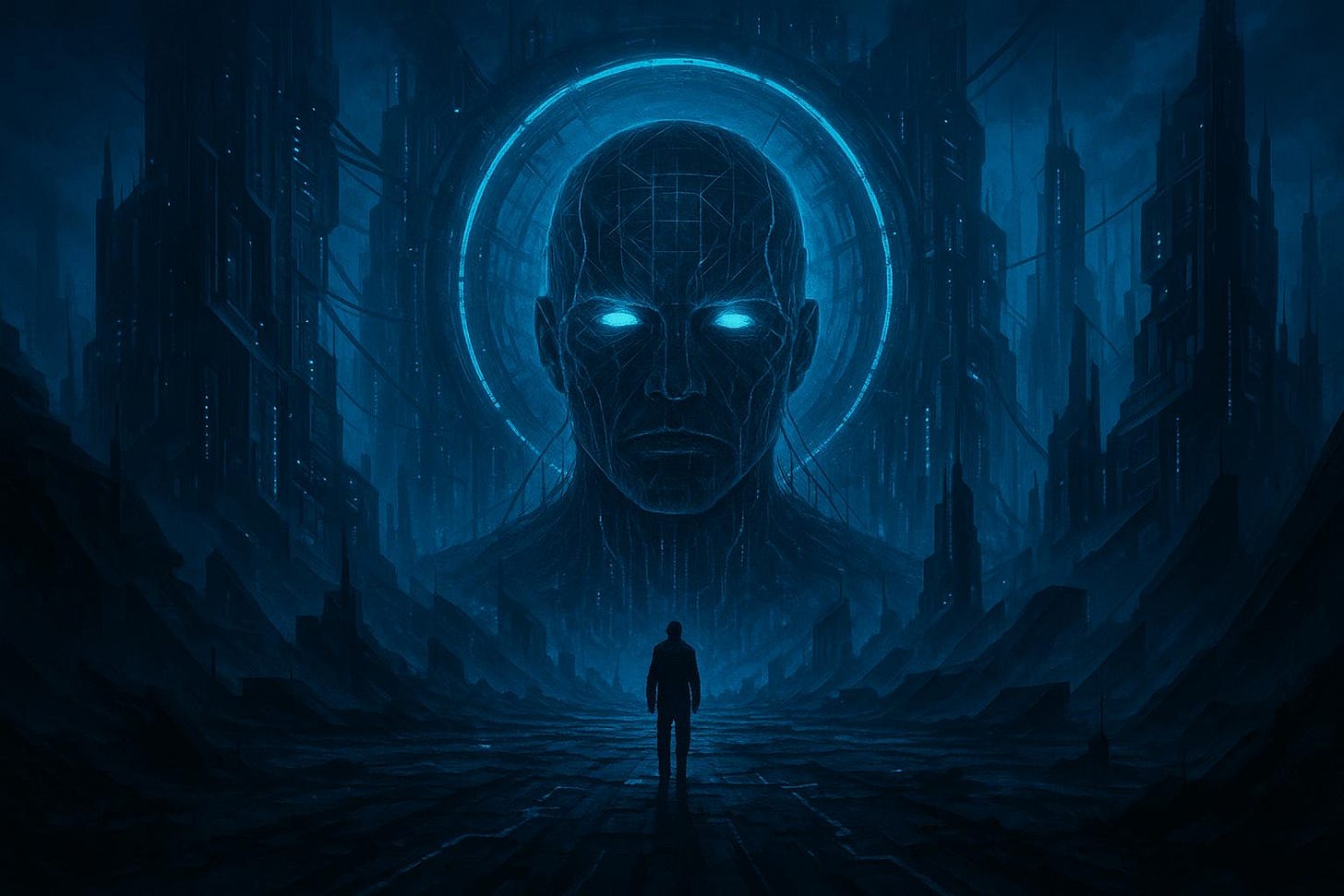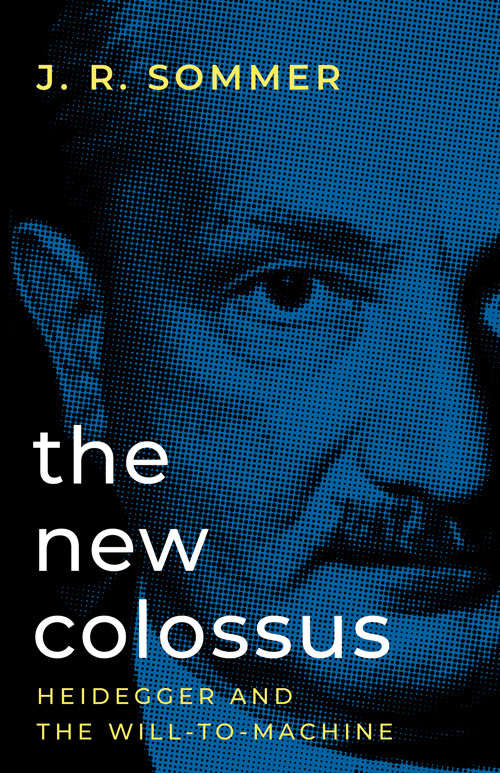AGI as a Weapon of Mass Destruction
by J. R. Sommer
J. R. Sommer unveils Project Stargate as the Machine’s quiet triumph, a techno-messianic revelation cloaked in promises of health and safety, where man, reduced to instrument, marches blindly toward an end foreseen at his beginning.
The organizers of a revolution always desire to rationalize the irrational element in revolution, but all the same they are its instruments.
— Nikolai Berdyaev, The Origin of Russian Communism
Project Stargate, which President Donald Trump touts to be “the largest AI [artificial intelligence] infrastructure project in history,” was announced via press conference on the first full day of his second term. After his boast, the president introduced Larry Ellison (Oracle), Sam Altman (OpenAI), and Masayoshi Son (SoftBank; Arm) as the project’s principal managers. Each tycoon stressed AI’s potential to “deliver a better future,” citing mainly the possibility of curing “cancers,” if not, tacitly, all disease. In fact, nearly every time a tech or finance tycoon dangles the power of AI before the public, it is done with assurances that life will be “better” in the AI-driven world — i.e., safer, healthier, more entertaining. Powerbrokers in purported “democracies” across the world have made similar promises when expanding their equally purported “power” since the definitive advent of the liberal-Marxist world in 1945. Such promises must be made to goad the ever-unsuspecting public in the appropriate direction. This is the shaping of public opinion, nothing more; if one is convinced of a thing’s benefit, then this thing is incontrovertibly beneficial, regardless of any practical consequence. All that must be done to sustain the perception is the occasional highly publicized positive (“winning,” in modern parlance). Meantime, ulterior existential dangers continue to mount.
The purpose of Project Stargate, ultimately, is to generate Artificial General Intelligence (AGI) in the United States — AGI, roughly, being artificially generated “consciousness,” acknowledging here the ambiguity of the concept. If AGI was such a boon to humanity, generally, then it of course wouldn’t matter where it was developed. However, the main thrust of Stargate is to enrich and empower its principal developers and the politicians permitting its deregulated existence. This is where President Trump’s “Big, Beautiful Bill” comes in, enacting a 10-year moratorium on any AI regulation in the United States. It seems the general consensus among the more entrepreneurial AI researchers is that AGI will arrive in the next five to ten years (“When Will AGI/Singularity Happen? 8,590 Predictions Analyzed”), so a 10-year moratorium on regulation from a business-minded administration fits.
Cuing the tycoons on their purpose at the press conference’s start, President Trump praises the three businessmen on their “massive ... talent and money.” Altman, being the least experienced of the three tycoons, does not reiterate the public benefits of the project — public repetition being the principal aim of the conference — during his turn to speak, so the American president encourages him to retake the stage and alleviate the concerns of listeners who might suspect the project is only about monetary profit (under the guise of “national security” and “public health”). And jobs! — Yes, the effort to improve AI will create “hundreds of thousands of jobs.” Never mind that AI will eliminate the need for ten times the number of jobs it creates; enter the consolidation of profit; enter the metaverse — to keep the unemployed occupied and in-formed until they can monetize their way into an unexamined extinction. Despite the quartet’s best efforts, however, these suspicions can hardly be lessened in the wake of, for instance, the recent mass exodus of several risk analysts/AI researchers from OpenAI. The rush to develop AGI rolls on.
Another incentive to be the first corporate state to develop AGI is the perennial fear of safeguarding “national security.” The meaninglessness of “nation” in the liberal-Marxist world of profit, “social constructs,” and open borders aside, the idea is that AGI, if generated, will be something of a weapon of mass destruction — not in a massive-bomb sense, but in a Sun-Tzu sense, wherein the designated adversary will be defeated before the conflict obviously begins. AGI-as-weapon will have the ability to protect friendly systems while simultaneously crippling adversaries through the arrangement of insidious efforts across societal domains. The theoretical concern at the governmental level is that, to prevent “national” catastrophe at the hands of adversarial AGI, the proverbial “we” must develop it before the ever-evil “other.” Many business interests will undoubtedly be adversely affected by such catastrophe; so protecting them is of utmost “national” interest — to preserve freedom (i.e., economic interests), naturally. Again, if developed, AGI would serve as the ultimate “deterrent” — no one would dare interfere with the AGI wielder’s welfare.
Unfortunately, “deterrence” is nothing more than a laughable buzzword of the military-industrial complex. No one is deterred who bears a vision of the future, and each modern corporate state holds dear its own vision.1 One adversarial state does not deter the other so much as present a challenge to be overcome, which, in fact, strengthens the one challenged. When the existence of an opposing philosophy is perceived to be existentially threatening, one does not simply yield to the threat. Rather, the materially weaker state finds ways to asymmetrically oppose the stronger. That asymmetric warfare exists is proof that deterrence does not (exist). Nevertheless, “deterrence” is a cudgel that doesn’t budge — it remains the ever-ready fear inducer meant to milk resources from the mindless masses; enter always-rising defense budgets. Behind it all is the apparent fact that, shockingly, once again, no state is deterred from pursuing its own version of AGI. If a corporate state has the means to develop AGI, it will develop it; if it doesn’t have the means, it will find a way to get them. This is life as will — specifically, the will-to-machine.
Perhaps we are in the midst of an AI revolution — the result of which will be an unrecognizable world. Perhaps this unrecognizability will stem from the final loss of the humanity that still desperately, but weakly, clings to the best of us. Berdyaev noted the tool-like nature of even the most rational of revolutionaries: All are instruments of fate. It so happens that this fate is the will; it also happens that the revolution is not new but the purpose of our old existence. Revolution is the vision of the uninitiated.
Masayoshi Son, Stargate’s chairman, is optimistic that AGI is “happening soon” — but it is “not the goal”; rather, the goal is Artificial Super-Intelligence — for health and safety, no doubt. What is this sentiment if not the retrospective echo of a future that man-as-instrument has already surrendered? It seems clear that what we doubt is ourselves. To see beyond the dead-end horizon of our empty self, we invoke futural visions: Oracle, Palantir, Maven, Neuralink, DeepMind, DeepSeek — beyond the self we seek salvation in the merging of mind and machine, a revolution present in our inception and, thus, no revolution at all.
To see the future is to own it. We collectively contribute to the determined future’s arrival with our acquiescence to the soul-and money-expensive machinations of mavens assuring us of perpetual health and safety. Future power does not follow an imagined revolution; it is conjured from the depths of our beginning — and with it arises the Machine we nurture at the core of a vacant vessel. This Machine is the New Colossus, which is as old as man itself. Through us, our future dangles fantastic benefits before us — before the unsuspecting masses to entice them into docilely accepting their antithesis, which generates a new synthesis of servility. The New Colossus — our Electronic Messiah — isn’t yet to come; it has already arrived. Machine’s arrival is not revolution, but revelation: no one saw it coming because its victory is a fait accompli. As Nietzsche said, it has only moved out of our sight, because it — has achieved victory.2 We see it now because man’s end is just over the horizon.
Order J. R. Sommer’s The New Colossus: Heidegger and the Will-to-Machine.
That is, at the “local” level—as in, fulfilling one’s “local destiny.” However, the inceptual, overarching vision to summon Machine remains the same. See The New Colossus (Arktos, 2025).
Nietzsche, On the Genealogy of Morals, Essay 1, §7





I'm ordering your book today. I'd like to read it at least twice or three times before commenting.
"Future Power" is the title I gave this essay. The point is not AI; the point is the source of perceived power.